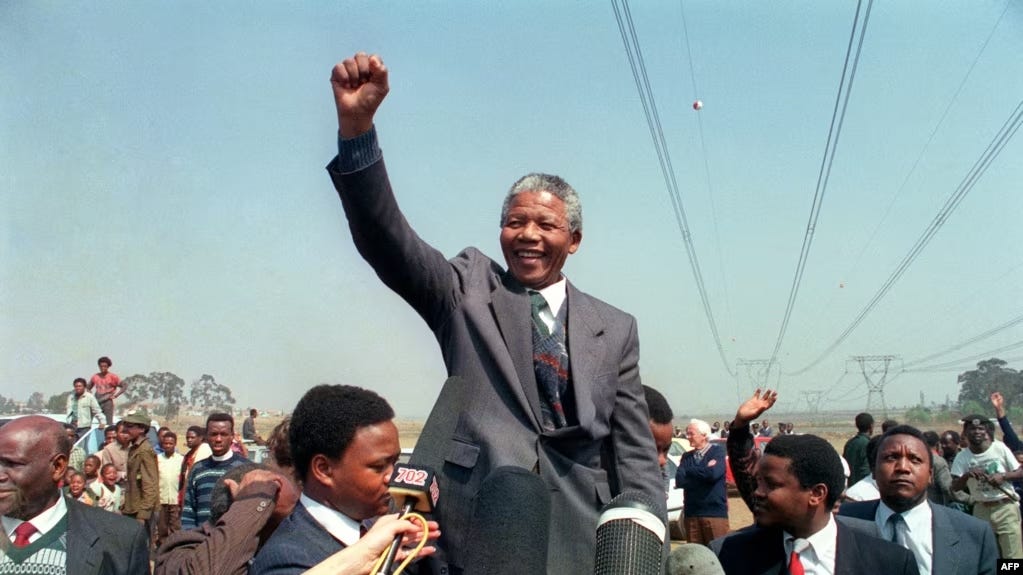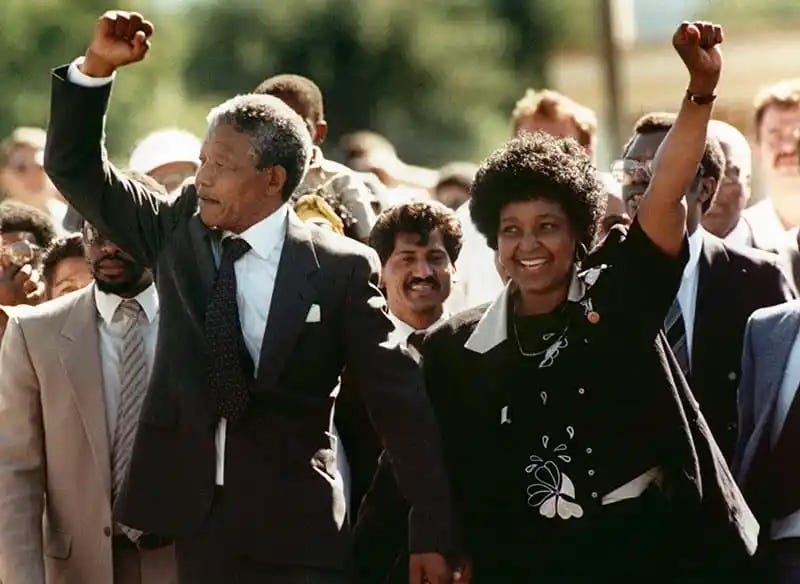Nelson Mandela: The Man Who Taught a Nation to Forgive
Born 18th July 1918 – Died 5th December 2013 It was always...History
Early Life in the Eastern Cape
There are lives you study in history and then there are lives you feel. Nelson Mandela was one of those rare figures whose story did not just shape a nation, it moved the world. I have always found that the deeper I read into his journey, the more extraordinary it becomes. It is not just that he became President, or that he spent 27 years in prison. It is that after all that, he still chose reconciliation over revenge. I cannot think of many leaders who have ever managed to do that, especially with as much dignity.
Mandela was born on this day, 18th July, in 1918 in the small village of Mvezo in the Eastern Cape of South Africa. His given name was Rolihlahla, which roughly translates to “pulling the branch of a tree”, or more colloquially, “troublemaker”. There is something poetic about that, in hindsight. He would spend his life challenging structures that had seemed immovable, tearing at the branches of a deeply entrenched system of racial injustice.
He was given the name ‘Nelson’ by a teacher on his first day at a Methodist school. That, in itself, tells a story. Even as a child, his identity was being shaped by a colonial lens. But education was a key to his early path. After his father’s death, he was taken under the wing of Chief Jongintaba Dalindyebo, and it was here that Mandela was first exposed to leadership, duty and custom. His upbringing was steeped in tradition, yet his path would lead him to rebel against the very structure that had formed him.
Journey Into Activism and the ANC
His years at the University of Fort Hare and later at the University of Witwatersrand were shaped by an increasing awareness of injustice. It was in Johannesburg, where he worked as a night watchman and law clerk, that Mandela truly came into political consciousness. The city, like the country, was boiling over with tension. The apartheid regime was becoming more ruthless by the year, and Mandela soon joined the African National Congress (ANC) in 1944.
It is worth remembering that Mandela was not always the soft-spoken elder statesman the world later came to revere. He was a fiery young activist in his early political days, believing that peaceful protest alone would not bring change. Alongside Oliver Tambo and Walter Sisulu, he helped form the ANC Youth League, bringing a new energy to the anti-apartheid struggle.
The turning point came in the 1960s. After the Sharpeville Massacre in 1960, when 69 black South Africans were killed by police during a peaceful protest, Mandela made a dramatic shift. He co-founded Umkhonto we Sizwe, the armed wing of the ANC, believing that the time had come to meet violence with resistance. It is easy now to judge those decisions in the calm of hindsight, but at the time, the world had all but turned its back on black South Africans. The fight was desperate and dangerous.
Robben Island and the Long Walk to Freedom
Mandela’s arrest in 1962 led to what would become one of the most symbolic trials in modern history. The Rivonia Trial was not just a court case, it was a moment of reckoning. I have read his speech from the dock many times and it still gives me goosebumps. When he said, “I have cherished the ideal of a democratic and free society,” and closed with “It is an ideal for which I am prepared to die,” you realised he was speaking not just as a man, but as a symbol.
He was sentenced to life imprisonment, and spent 18 of his 27 years on Robben Island, locked in a cell so small he could touch both walls with outstretched arms. Yet those years did not break him. They shaped him. The Mandela who emerged from prison in 1990 was not the militant youth of the 1950s. He was older, calmer, and more formidable than ever. What struck the world most was his grace. He walked out of Victor Verster Prison with his fist raised, not in vengeance, but in victory of the spirit.
From that moment, South Africa changed. Slowly, then all at once. Negotiations with the apartheid government followed. There were walkouts, assassinations and deep mistrust. But Mandela never wavered from the belief that peace was possible. It would have been so easy for him to demand retribution. Instead, he preached unity. He convinced black South Africans to vote, not to riot. He persuaded white South Africans to stay, not to flee.
A President Who Chose Reconciliation
In 1994, South Africa held its first democratic election. I remember watching it unfold on television, knowing history was being written in real time. The images of long queues, some stretching for miles, people of all ages waiting patiently, most of them voting for the first time, will stay with me forever. Mandela was elected President, and with that, a new chapter began.
His presidency from 1994 to 1999 was not without challenge. He inherited a fractured nation, broken by decades of legalised racism, economic disparity and generational trauma. Yet he led with compassion. He formed a government of national unity, even offering cabinet posts to his former enemies. That took a kind of moral strength that is hard to fathom.
One of Mandela’s most powerful legacies was the Truth and Reconciliation Commission, chaired by Archbishop Desmond Tutu. It was based on the idea that uncovering the truth was the first step to healing. Victims could speak. Perpetrators could confess. It was never perfect, but it was honest. And perhaps most importantly, it gave South Africa a way forward.
Mandela stepped down in 1999 after one term, proving once again that he was a servant of the people, not a ruler for power’s sake. He could have stayed on, basked in global adoration, but he knew that real change came from institutions, not individuals. After leaving office, he became a global statesman, campaigning on HIV/AIDS awareness, education and peace.
Legacy That Lives On Across Generations
He was awarded the Nobel Peace Prize, honoured by countries around the world, and held in reverence by people from all walks of life. Yet he never lost his humility. When asked how he managed to remain so kind and forgiving, he often spoke of his comrades, many of whom did not live to see the dawn of freedom.
Mandela passed away on 5th December 2013, and the world wept. Not with despair, but with deep respect. South Africa mourned him as a father. The world mourned him as a moral compass. I remember seeing images of children lighting candles outside his home, young and old gathered in prayer and song, and I realised then, his legacy would live on through them.
He taught a nation to forgive without forgetting. He believed in the potential of every human being to change. He showed us that leadership is not about dominance, but service. And that love, when wielded with courage, can dismantle even the most entrenched hatred.
More than anything, Nelson Mandela proved that one life, lived with purpose, can alter the course of history. And I think about that every time his name comes up, every time I see his face on a wall, or hear his words quoted by someone who perhaps never knew the full scale of what he endured.
He was born into a world that wanted to keep him in chains. He died in a world that called him a liberator. That is the arc of his life. And that is why, on this day, the 18th of July, we remember him not only for what he did, but for who he was.
Nelson Rolihlahla Mandela
A man who gave his life to a dream, and never let the darkness of the world take away his light.



